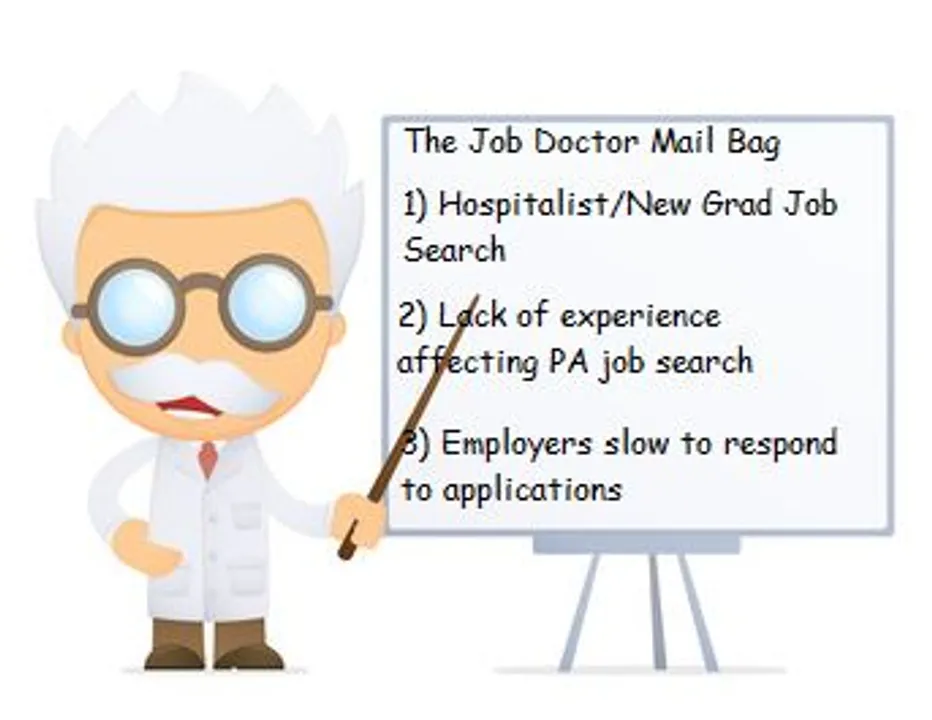The Job Doctor Mailbag - Major Metro Hospitalist Jobs for New Grads & More

© artenot / Fotolia
Hospitalist Job Search for New Grad in Major Metro
Matt, a physician on Google + writes: The search for my first post residency hospitalist position has brought up a few questions/concerns that I was hoping you may be able to offer an opinion on.
It seems that large cities like Chicago, DC, Boston, San Francisco, (possibly NYC) have limited daytime, permanent, new grad positions available. Will these large cities likely have more opportunities after I have 2-3 years experience since I won't be a newbie grad anymore?
How much of a factor does "experience" play? For example, if I find a busy position in a suburban location, after 2-3 years, will I be able (with patience) to relocate to a better position in one of those large market cities?
The Job Doctor Responds: Thanks for your questions Matt!
Major metros like the cities you mentioned are often times tough places for physicians to find good jobs, regardless of experience level. We hear all the time about shortages of physicians, but those don’t really exist in the types of job markets you mentioned, with the exception usually being uninsured or under-insured populations. Frankly, most employers in those types of cities receive more than enough applications for their jobs. Local candidates are usually available, and employers can afford to be highly selective on criteria such as a candidate’s experience level or education/training background.
You’ll definitely become a more marketable candidate with 2-3 years of experience under your belt. Make sure it’s the right kind of experience though. The best opportunity for you would probably be relocating to a higher demand market such as a medium to small sized town in the Midwest and working as a hospitalist. If that is not a good option for you, then taking as much in-patient call as possible and doing inpatient procedures, working in a skilled nursing facility, or doing some ER shifts are options that would provide some relevant experience.
That last question about experience is a complicated one, and the answer is highly dependent on your definition of "better". In general, the more central to one of these major metros you choose to practice the less demand their will be for your services, the more competition you'll run into for available jobs, and the higher the costs will be to practice medicine. None of those are good factors for finding a "better" job. If by "better" all you mean is that you'll be more centrally located in a more desirable location (by your personal standards) then yes, gaining more experience at a busy suburban location will probably be helpful in your quest for a major metro hospitalist position. In this scenario yo will benefit from your experience, and also from the fact that you'll become a local candidate who is easy to interview and hopefully is connected to the local medical community.
Some other tips that might help you reach your goals are: be willing/able to do procedures, emphasize any strong ties you have to any of those areas, let employers know when you’ll be visiting those areas so they won’t have an expense to interview you, and work hard at networking with colleagues in those areas.
Hope that helps, and good luck with your search!
Job Search Advice for Newly Graduated Advanced Practitioners
New_Grad_PA emails: I’m a newly graduated physician assistant and could use your advice. It seems that every desirable job that I find advertised online states that candidates must have 1 to 3 years of experience for consideration. Currently I’m doing some urgent care moonlighting while I continue my search, but what can I do to improve my situation?
The Job Doctor responds: Well, to some extent you’re already doing it. Urgent care moonlighting is great experience because of the variety of patients and acuity you are likely dealing with.
I know that’s not really the advice you’re looking for though, so I’ll add that it’s also a good idea to go ahead and apply for jobs that you feel you would be a good fit for, even if you don’t have the required amount of experience. Taking this tactic will definitely result in some rejections for the predictable reason of not enough experience. However, if you don’t ever apply, you won’t ever know if there is an exception, or if the employer is perhaps advertising for an ideal candidate but would be willing to hire a strong candidate who meets most, but not all, of their needs. Beyond that, I would advise that you seek out jobs in your local market, because not many employers are willing to relocate an inexperienced/unproven physician assistant. If you are looking to relocate, I would advise you to focus on areas in which you have strong ties and emphasize those ties to prospective employers, as they may perceive them as an indicator of the likelihood that you could be a long term hire.
Employers at HospitalRecruiting.com Slow to Respond?
Jim from our blog comment section writes: Why do some of the employers on this site take so long to respond to applications?
The Job Doctor responds: I don't have a definite answer on this for you Jim, but I do have some advice.
There are many reasons which may explain why an employer could take awhile to get back to a job seeker. High volume of applications, lack of interest, recruiting effort temporarily paused, or slow corporate processes are only a few of the literally countless possibilities. My advice is to not assume it’s a negative reason, and carry on with your job search and applications with other options until it’s resolved. I know that sounds basic, but it’s important to not let impatience creep into your psyche, because recruiters will pick up on that and it doesn’t help anything.
Another piece of advice is to try to time your applications all together instead of applying for your favorite job first, second favorite second, and so on. The advantage of sending out your applications in close succession is that you can find out how much interest you generate more quickly, and you find out more quickly which options are willing and able to move forward on a time frame that suits your needs.
Related Posts
